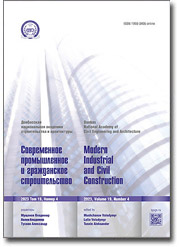Sodium Hypochlorite as an Alternative Reagent for Disinfection and Increasing the Stability of Excess Sludge Biomass
Abstract: The paper investigates the effect of the chemical disinfectant sodium hypochlorite on excess sludge biomass in terms of increasing its stability and reducing pathogenic contamination. The effect of «active» chlorine on an increase in the redox potential and pH of the sludge mixture has been established. The proposed concentration of «active» chlorine of 15 mg/g of sediment ensures sediment stability at the level of 93 %, which suppresses the growth of putrefactive and facultatively anaerobic microorganisms, including pathogenic ones, during 12 days of sediment storage at a humidity of 95 % or more. The effectiveness of reducing the amount of the bacterial group of E. coli in the sediment during its treatment with sodium hypochlorite was established, which amounted to 95 %. Treated sediment with sodium hypochlorite is recommended for biological reclamation of infertile soils.
Keywords: disinfection, excess biomass, sodium hypochlorite, stability, pathogenic microorganisms.
Pages: 153-161.
For citation:
For citation: Nezdoiminov, V. I.; Mogukalo, A. V.; Ruchka, V. V. Sodium Hypochlorite as an Alternative Reagent for Disinfection and Increasing the Stability of Excess Sludge Biomass. – Text : electronic. – In: <em>Modern Industrial and Civil Construction</em>. – 2024. – Vol. 20, N 3. – Р. 153-161. – doi: 10.71536/spgs.2024.v20n3.4. – edn: fietoc. – ISSN 1993-3495. (in Russian)

Vol. 20, N 3 (2024)
Journal: Modern Industrial and Civil Construction
Publish house: Donbas National Academy of Civil Engineering and Architecture
Journal: Modern Industrial and Civil Construction
Publish house: Donbas National Academy of Civil Engineering and Architecture
